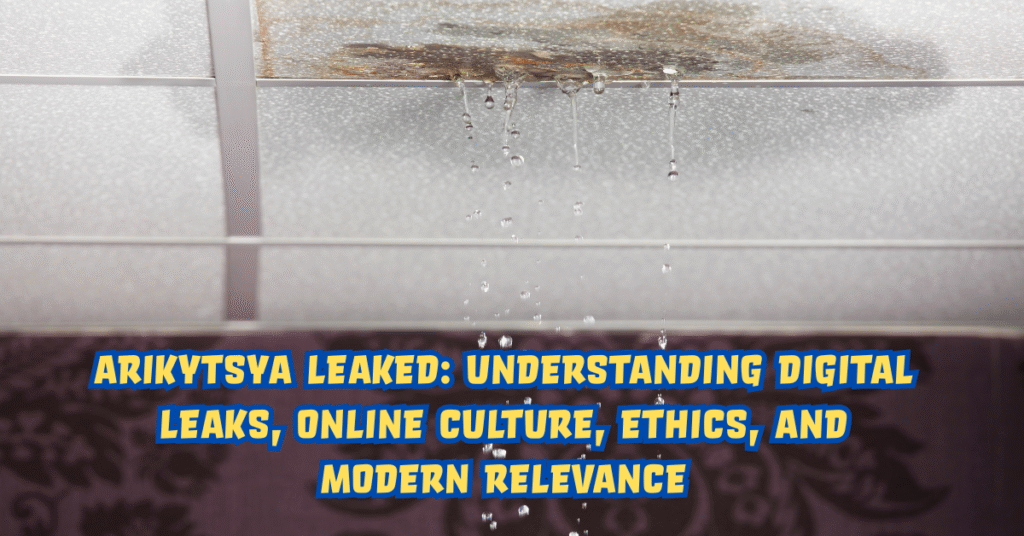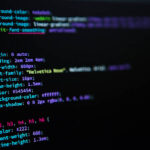The term “arikytsya leaked” has appeared across online searches and discussions, raising curiosity among digital audiences. For many, it immediately sparks questions: What does it mean? Does it reference private content, a cultural phenomenon, or part of the broader digital leaks landscape? To answer this, it’s essential to look beyond the literal phrasing. The phrase belongs to a growing wave of keywords surrounding “leaks” online, which often refer to content — sometimes personal, sometimes entertainment-related — that surfaces unexpectedly in the public domain. These leaks may involve videos, photos, data, or even intellectual property. Whether “arikytsya” is a username, brand, or online identity, its connection with the word “leaked” signals how modern internet culture thrives on curiosity, exposure, and instant sharing. This article provides a comprehensive guide to understanding such leaks, their cultural and ethical implications, and why they continue to capture global attention.
The Rise of the “Leak Culture” in the Digital Era
Leak culture is not new, but the internet has amplified its reach and consequences in unprecedented ways. Decades ago, leaks often meant classified documents or insider information slowly passed to journalists. Today, however, any individual with a smartphone can become a subject of a leak, and a single post can reach millions within hours. The fascination lies in the forbidden element: leaked material suggests access to something private, exclusive, or restricted. This combination of secrecy and exposure is why leaks often go viral, even when their authenticity is questionable. In the case of phrases like “arikytsya leaked,” the intrigue is heightened because users are unsure what exactly they will find, yet the curiosity alone fuels clicks. Understanding leak culture requires acknowledging this blend of human psychology, media sensationalism, and the rapid distribution power of digital platforms.
Why “Arikytsya Leaked” Matters in Online Discourse
The importance of the phrase “arikytsya leaked” extends beyond the specific identity behind it. It highlights broader conversations about online safety, accountability, and the fragile boundary between public and private spaces. For creators, influencers, or professionals associated with the name, a leak can shape reputations overnight — sometimes unjustly. For audiences, the act of searching or consuming leaked material brings up ethical questions: should curiosity override respect for privacy? In an era where attention is currency, leaks often blur lines between exposure and exploitation. Even without knowing the exact origins of “arikytsya leaked,” its presence as a trending search reflects how society grapples with both fascination and discomfort when confronted with private material entering public spaces. This duality makes the discussion relevant not only to individuals but also to policymakers, digital platforms, and educators aiming to promote online responsibility.
Anatomy of a Digital Leak: How They Spread
To understand why terms like “arikytsya leaked” gain traction, it helps to examine the mechanics of leaks. A digital leak often starts with one source — either intentional disclosure or unauthorized access. From there, platforms such as forums, private messaging groups, or file-sharing sites act as multipliers. Social media algorithms accelerate visibility, rewarding content that garners engagement, regardless of its ethical implications. Within hours, a leak can become global, replicated across hundreds of accounts and mirrored on sites worldwide. What makes leaks particularly difficult to contain is the permanence of digital footprints. Even if platforms remove the material, cached versions and re-uploads keep circulating. This is why reputational and emotional damage from leaks is often long-lasting. The case of “arikytsya leaked” illustrates how quickly a single keyword can travel, fueling discussions even among those who may not know its full context.
The Human Cost of Online Leaks
Behind every leaked keyword or file lies a human story. While audiences may view leaks as entertainment or curiosity-driven diversions, those affected often experience profound consequences. Emotional distress, reputational harm, loss of opportunities, and breaches of trust are common outcomes. In more severe cases, individuals targeted by leaks may face harassment, cyberbullying, or exploitation. The phrase “arikytsya leaked” underscores this tension: what feels like a trend to one group may represent trauma to another. Experts often argue that addressing leak culture requires a shift in perspective — moving away from viewing leaked content as harmless gossip and toward recognizing its impact on real people. Just as society condemns invasions of privacy offline, the same principles should extend online. This reframing is crucial to countering the normalization of leak culture in digital spaces.
Legal and Ethical Dimensions of Leaks
The legality of leaks depends on their nature. Corporate leaks involving confidential data often fall under intellectual property or national security law. Personal leaks, such as private photos or videos, may constitute violations of privacy rights and even criminal offenses if shared without consent. The ethical questions, however, go deeper. Should media outlets report on leaks, knowing they amplify exposure? Should platforms censor leaks aggressively, even at the risk of being accused of overregulation? The keyword “arikytsya leaked” provides a lens to explore these dilemmas. While curiosity may drive search behavior, responsibility should guide action. Legal frameworks continue to evolve, but ethics require collective accountability — from tech companies enforcing protections to users making conscious decisions about what they consume and share.
Comparing Types of Leaks in the Digital Age
| Type of Leak | Description | Common Examples | Potential Impact |
|---|---|---|---|
| Personal Content Leaks | Unauthorized sharing of private photos, videos, or chats | Influencers, everyday individuals | Emotional distress, reputational damage |
| Corporate Leaks | Confidential business information made public | Internal memos, product designs | Financial loss, competitive disadvantage |
| Entertainment Leaks | Early release of media content | Films, music albums, video games | Revenue loss, fan speculation, piracy |
| Political Leaks | Disclosure of classified or sensitive government information | Whistleblower files, diplomatic cables | Policy shifts, public scandals, global impact |
How Users Drive the Demand for Leaks
Leaks do not thrive in isolation; they depend on audience demand. Each click, search, or share reinforces the cycle, signaling to platforms that leaked content is “valuable.” This demand-driven dynamic explains why terms like “arikytsya leaked” rise quickly in search rankings. Curiosity is a powerful driver, but it also carries responsibility. By clicking on leaked content, users inadvertently validate invasive practices. This makes audience education critical: understanding that behind every leak is a choice, and those choices collectively shape online culture. Encouraging responsible consumption — or better yet, discouraging engagement with leaks entirely — can reduce their spread. Platforms, too, are experimenting with interventions, such as demoting leaked content in algorithms or attaching warning labels. Still, the cycle remains difficult to break without shifting collective digital behavior.
Protecting Against Leaks in the Digital World
For individuals worried about becoming targets of leaks, digital hygiene is key. Strong passwords, two-factor authentication, and cautious sharing habits reduce vulnerability. However, technology is only part of the solution. Building awareness about the risks of oversharing and understanding privacy settings on platforms are equally important. For creators, watermarking content or limiting distribution channels can help. In the broader sense, however, society needs to foster empathy: recognizing that sharing or amplifying leaks perpetuates harm. While the keyword “arikytsya leaked” may appear harmless as a search term, the best defense against harmful leaks lies in a combination of personal vigilance and collective restraint.
Broader Cultural Relevance of Leaks
Leaks are now embedded in modern culture, shaping everything from politics to entertainment. The fascination with the hidden, the exclusive, and the controversial ensures that leaks will remain part of digital discourse. The phrase “arikytsya leaked” is one of many examples illustrating how quickly such terms gain traction. Beyond curiosity, leaks often reflect power dynamics — who controls information, who gains from exposure, and who loses. In this sense, studying leaks offers insights into broader societal values, fears, and contradictions. As one cultural critic put it: “Leaks are not just about information; they are about what society chooses to value and expose.” This perspective positions leaks as cultural artifacts, worthy of critical examination rather than passive consumption.
Table: Positive vs. Negative Impacts of Leak Culture
| Positive Impacts | Negative Impacts |
|---|---|
| Exposes corruption or wrongdoing | Violates personal privacy |
| Drives transparency in politics/business | Causes emotional harm to individuals |
| Builds anticipation for entertainment | Leads to piracy and financial loss |
| Sparks global conversations | Normalizes unethical consumption of content |
Conclusion
The keyword “arikytsya leaked” serves as a case study in how the digital world consumes, processes, and debates leaks. While the specifics may remain unclear, the broader relevance is undeniable. It reminds us of the fragility of privacy in online spaces, the ethical challenges of modern media, and the enduring fascination humans have with the hidden or forbidden. As digital citizens, the responsibility lies in not just understanding these dynamics but also choosing how we engage with them. Leaks may always attract attention, but our collective behavior can shape whether they remain harmful trends or opportunities for reflection. Ultimately, the future of leak culture depends less on technology and more on empathy, accountability, and awareness.
FAQs
1. What does “arikytsya leaked” mean?
It refers to online discussions around leaked content associated with the term “arikytsya,” reflecting broader leak culture online.
2. Are leaks always illegal?
Not always. Some leaks expose corruption or misconduct, while others involve unlawful breaches of personal privacy.
3. Why are people drawn to leaked content?
Curiosity, exclusivity, and sensationalism make leaks attractive, even though they often cause harm to individuals or organizations.
4. Can someone protect themselves from leaks?
Yes. Strong digital hygiene, careful sharing, and awareness of online privacy settings reduce vulnerability to unauthorized exposure.
5. What is the modern relevance of leak culture?
Leaks shape media, politics, and entertainment, raising ethical questions about privacy, transparency, and consumer responsibility.







